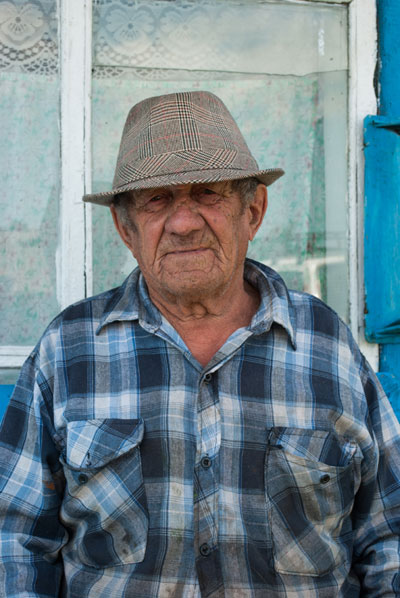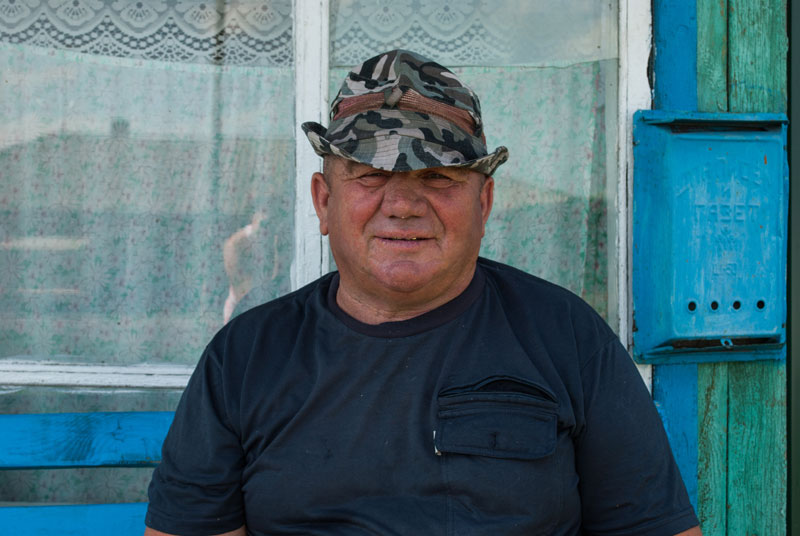









 Alexander Heinrichovich Werner was born in Saratov Region, hamlet of
Alt-Warenburg on 25th August 1929.
Alexander Heinrichovich Werner was born in Saratov Region, hamlet of
Alt-Warenburg on 25th August 1929.
His father Andrei Karlovich Werner (born 1905) and his stepmother Kristina Kondratevna Werner (born 1906) were deported together with their son and grandparents from the Saratov Region, hamlet of Alt-Warenburg (Privolnoe) in 1941. There they had owned a big house, kept a farm, and there had been orchards and vegetable gardens. By barge they were taken to the railroad station, where they forced to board a train. They had only taken a long a few belongings, just those things which they had been able to pack and bundle up in haste. They were taken to Abakan in „freight-cars“, which were normally destined for the transportation of cattle. They were equipped with pallets to sit and sleep on. While they were on their way, all concern about how to feed weighed heavily on the exiles; at least, officially, they were not supposed to receive food during the trip. By far not all of them had been able to take along provisions from home. Others tried to buy something to eat from old women, who sold every kind of things at the train stations, when the train would stop for a while.
From Abakan they were sent on to the hamlet of Staromolino ab, where they were accommodated in an old local’s house. The grandfather was a shoemaker. Hence, they were not confronted with serious problems regarding the supply of foodstuffs: there were always people who wanted to have their shoes mended, and then they would usually pay with natural produce. Later they were given a cow. And once they even received a whole mattress filled with wheat. The stepmother did not work at all, but the father was working for the kolkhoz farm. He mainly transported lads by horses. A year later they mobilized the father into the labor army, to a place situated somewhere in the Ural Mountains, where he was assigned to fell trees. As he told his son later, many laborers died there; it would happen that they got to see two or three dead bodies a day. They dug trenches and piled the corpses in them. The food ration was sparse – just 200 grams of bread per day. Two years later he returned.
Alexander Heinrichovich did not go to school; in Saratov Region he had only managed to attend the first grade. At the age of 12 he started to go to work. At first he tended sheep throughout the whole summer. The second year they gave him a horse during the winter-time, by which he was supposed to transport firewood. Afterwards he received two horses for the transportation of hay.
Once a month his parents had to go and get registered with the commandant’s office. The locals did not behave very well towards them; sometimes the called them “Fascists”, and sometimes they raised a quarrel and verbally harassed them. „Those who had slightly more brains, recognized, what kind of Fascists we were: we had spent all our life in the Soviet-Union, after all!”
Alexander Heinrichovich’s stepmother practically did not speak any Russian at all. When they had still been in Saratov Region, his father had spoken a little Russian with locals every now and then. Her son had no knowledge of the Russian language, but he was quick in learning.
In Karatus District two more sons were born to his parents: Nikolai and Viktor. The latter later left for Germany. They are not considered as victims of the repressions, as they were born after 1960; Alexander Heinrichovich does not recall the exact date of their birth.
The family kept the German traditions; they used to celebrate the Catholic Christmas and Easter. And at the same time they also got used to the Russian holidays – the 1st of May, for example. Their meals were mainly based on German cooking recipes.
Six years later the Werner family lived not far away in another village. Alexander Heinrichovich cannot remember the exact name of the place; he just said that „they lived on a farm“. Later he got married to a Russian girl. His parents were first, but then they made friends with their daughter-in-law. The young couple moved to Chubchikovo, where son Viktor Alexandrovich Werner was born in 1959. Two more sons were born to them later– Anatoliy and Vladimir. The latter left for Germany more than twenty years ago; he still lives there. His wife learned how to cook German meals. She worked as a milkmaid, while Alexander Heinrichovich had a job in the kolkhoz. Later they went to Alma-Ata and lived there for about three years. They got homesick, however, were longing for their native place, and therefore returned to Cheremushka, where they were assigned a flat. Alexander Heinrichovich says that everybody would know him there; he was a good worker. He worked as a locksmith, until he finally went on pension.
His son tried to convince him to come to Germany, but Alexander Heinrichovich refused. He went there for a visit for one month, but he did not like it there. „I do not know their language. I enter a shop, listen, trying to find out whether I can recall a few words. I was able to understand a couple of words, but it is a big difference, if you have to speak yourself“. He told his son that he preferred to yet wait a little bit, but then his wife died and he decided to stay in his native place. „I want to get buried here together with my wife“.
When he applied for his pension he learned that he had been rehabilitated.
Alexander Heinrichovich‘s son, Viktor Alexandrovich Werner, did not sense the consequences of the repressions seriously, although it had happened in his childhood that he had been insulted and abused at school, but they had defended themselves and fought back. They had owned a solid house, had lived a farming life. They did not really observe traditions and did not pass them to their descendants, either. This is practically all Viktor Alexandrovich recalls from his childhood. He neither considers himself a German nor a Russian: „I am Siberian“, he says. He did not want to leave for Germany; people told him that there was nothing to do for him. He is unable to understand and speak German. When he applied for his pension, he learned that he was acknowledged victim of the repressions.

Viktor Alexandrovich Werner
The interview was held by Tatyana Nazarets.
Expedition of the V.P. Astafev State Pedagogic University Krasnoyarsk and the Krasnoyarsk „Memorial“-Organization on the project „Anthropologic turn in social-humanitarian sciences: Methodology of field research and practical experience in the realization of narrative interviews“ - (Sponsored by the Mikhail-Prokhorov Foundation).